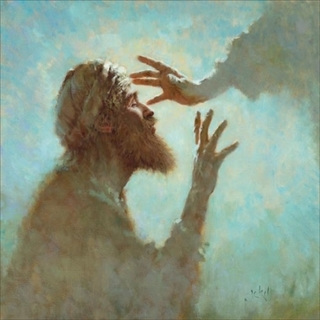 In this Sunday's Gospel we will hear the story of the deaf man with a speech impediment. Christ takes this man away by himself and does something very strange to him. Christ sticks His finger into the man's ears and, spitting, touches the man's tongue. I want to note a couple of things in this scene: 1) Christ touches the man's ears first. 2) Christ touches the man and spits.
In this Sunday's Gospel we will hear the story of the deaf man with a speech impediment. Christ takes this man away by himself and does something very strange to him. Christ sticks His finger into the man's ears and, spitting, touches the man's tongue. I want to note a couple of things in this scene: 1) Christ touches the man's ears first. 2) Christ touches the man and spits.We see in this act that there is a priority to Christ's actions, and I would not be so quick to dismiss it as incidental. The fact is, if you cannot hear, it is difficult if not impossible to speak. Hearing as a priority to speaking.
Next, I want to emphasize that Christ's actions are intimate. He touches the man. Unlike our other senses, touching is reciprocal. A person may see me if I see him, but not necessarily. A person may hear me if I hear him, but not necessarily. If I touch another person, they are necessarily touching me back. So, when Christ touches the deaf mute, the act is incredibly intimate.
Furthermore, this intimate act of touching relies on Christ's human nature to make the contact. Christ's actions are not simply divine actions. This sort of action theologians refer to as theandric, derived from the Greek words Theos-God and andro-Man. It refers specifically to divine actions carried out through Jesus' human nature. We can call it sacramental. These actions are signs of an invisible reality that takes place on account of the sign performed.
There is a sort of ex opere operato (from the work worked) that takes place. The healing of the deaf mute takes place because of the actions that Christ does. The reception of the healing does not rely on the merits of the man, but it does require his openness. Unlike the Sacraments, which are carried out by a priest, this action is also ex opere operantis (from the work of the worker), which is to say that it relies on the holiness of the worker, namely Christ. All sacraments derive their efficacy from Christ's holiness. The holiness of the minister of the Sacrament, who stands in the place of Christ, has no effect on the Sacrament. Christ's grace is conferred simply in the action of the Sacraments so long as they have the same intention and means.

The reason "Faith." is given as a response is because 'baptism' simply means 'washing.' All washing has a purpose, and the purpose of this particular washing is the forgiveness of original sin. The forgiveness, however, has its own purpose. It restores the original relationship that Adam had with God and exceeds that relationship with added grace. Adam's relationship with God was one in which Adam received natural life with preternatural gifts, e.g. St. Augustine says that Adam would receive so much grace from God that he would have had an extraordinary control over his body to the point of making music with his flatulence (City of God XIV:24). What Adam did not have was supernatural life.
Our baptism exceeds Adam's relationship by God granting us, through no merit of our own a share in His divine life. In the Mass when water is mixed with wine prior to the consecration the priest or deacon prays, "By the mixing of this water and wine, may we come to share in the divinity of Christ, who humbled himself to share in our humanity." In Baptism, Christ's divinity touches our humanity the same as it does in the reception of the Most Holy Eucharist. When it does, the immediate effect of that grace, in Baptism, is Faith. So, we can say that the effect of Baptism is Faith.
Faith is a supernatural gift. It is God's knowledge of Himself. It is a knowledge of things unseen. In our Baptism we have been made open to "hearing God's word and proclaiming His faith" just as the deaf mute was made open through Jesus' touch.
In openness we receive Faith. That same faith compels us to be perpetually open to Him. It compels us to spiritual poverty. It compels us to recognize our need for God and His wealth. Those who remain open to Him will be heirs of His kingdom. This is His promise to us.

No comments:
Post a Comment